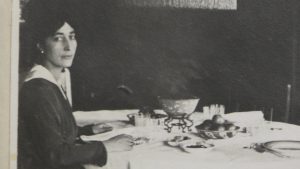https://www.timesofisrael.com/what-made-an-anti-semitic-spanish-diplomat-rescue-150-macedonian-jews-his-wife/
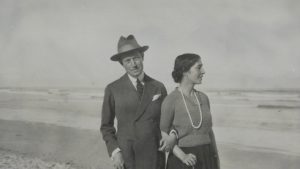
Archivist Eleftheria Daleziou looked puzzled when I asked her last March if the Gennadius historical library in Athens had any documents connected to Zoe Dragoumis. The Dragoumis family is one of the most famous families in Greece. Stefanos Dragoumis was a Greek prime minister at the beginning of the last century, Ion Dragoumis was a legendary revolutionary, and other family members were prominent political and military leaders. As we walked through the mammoth study hall Eleftheria pointed out several historians leafing through documents written by members of this influential family.
But no one, it seemed, had ever inquired about Zoe, one of Stefanos’ daughters, who passed away in 1964.
Together with fellow filmmaker Shiri Davidovitch, I was trying to unravel the mysterious rescue of 28 Macedonian Jewish families during the Holocaust.
It was seventy-seven years ago this month, when Bulgarian soldiers burst into the homes of the Jews living in Bulgarian-Occupied Macedonia and transferred them to the filthy warehouses of the Monopol tobacco factory in Skopje. During the next few weeks about 7,000 Jews were forced onto trains destined for Treblinka. Just before the last train departed, 28 families were suddenly freed.
Over the years various explanations for their release have been offered.
But not until Eleftheria unveiled a carton with the unopened diary of Zoe, along with her letters, did the full story emerge.
That story goes back to 1913 when Zoe fell in love with Julio Palencia, a mild-mannered Spanish diplomat. Unlike her five sisters, Zoe resisted her parents’ attempts to marry her to an Athenian aristocrat. Zoe stood her ground and insisted that she would only marry out of love. Finally at 31, a late age for a woman to be single in that era, she found the man she was looking for.
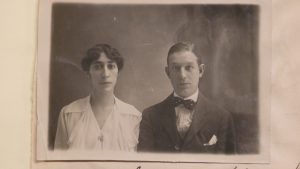
Following their wedding Zoe and Julio embarked for Costa Rica where Julio was appointed to be Spain’s ambassador. During the next three decades the couple would lead a gilded life in other exotic diplomatic postings that included Shanghai, South Africa and Morocco.
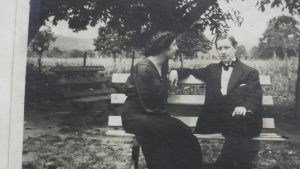
But something was missing. As Zoe wrote in a letter to her mother in French, the language of the Greek upper class:
“For my marriage to Julio I feel the purest bliss, “I ask of God two things only: that our happiness continues and that he finally sends us the child we so desire!”
Still childless in 1936, Zoe and Julio were stationed in Istanbul when the Spanish Civil War broke out. The war deeply divided Spain and would result in the death of more than 500,000 people. From the onset of the fighting, Julio sided with the Nationalists led by General Franco. This led him to clash with Turkey’s Jewish community which opposed Franco. Addressing Spain’s foreign minister, Julio wrote a blistering letter tinged with anti-Semitism:
“We must take action against this confused crowd with their bent backs, trembling hands and crooked eyes … because the Spain of Franco is always right…”
The action that Julio threatened Turkish Jews with, was to take away the Spanish passports they had obtained in the 1920s. During that period, Spain, in order to maintain an economic foothold in the crumbling Ottoman empire, gave Jews of Sephardic descent the opportunity to obtain Spanish nationality. About 5,000 Jews, including Sephardim in Turkey and Yugoslavian Macedonia, took up Spain’s offer.
The Spanish Civil War ended in 1939 without Spanish nationality being rescinded from the Jews and one year later Julio was assigned to Bulgaria where his attitude towards the Jews would inexplicably change.
Bulgaria did not officially become an ally of Nazi Germany until April 1941 but the government’s persecution of Jews was well underway before that.
Jews were forced to wear yellow stars, expelled from universities and their bank accounts seized.
As Zoe walked across Sofia to the Greek Embassy to send her family parcels of knittings , she would cross a street renamed Adolph Hitler Boulevard and see signs on parks and restaurants proclaiming: No Jews Allowed.
Moved by the suffering of the Jews she wrote that the sight of them left her “broken by emotions and sad to death.”
Zoe’s movements across Sofia were carefully documented, because unbeknownst to her, she was being followed by Bulgarian Secret Service agents. Bulgarian Prime Minister Bogdan Filov, aware that members of the Dragoumis family had led Greece in its wars with Bulgaria, was convinced that she was a Greek spy.
Zoe may not have been involved in acts of espionage but her diary does make clear what her feelings were towards Bulgaria which was allowing the Germans to cross through Bulgaria to invade Greece. “I wish Bulgaria were destroyed, “ she wrote, “and I was destroyed along with it. “
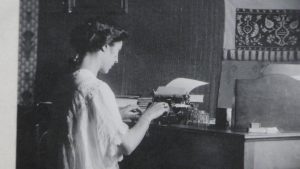
Her despair increased as she heard radio reports about the Germans hoisting a swastika flag on the Acropolis.
“Everything darkens as it all ends for me. I’ll never see Greece as it was …My dear ones, will I ever see you again in your homes? What will you do, my God? Could this mean the end of my Greece?”
She also pointed out that there was “great persecution of the Jews…who are taken by truck and sent to three parts of Bulgaria where they will be sent to concentration camps in Poland. Many are committing suicide.”
It stands to reason that her sympathy towards the Jews, driven by observing both Jews and Greeks suffering, would later on influence Julio’s actions.
The first indication of Julio’s change of heart towards the Jews could be seen when he asked the Franco government to intervene on behalf of the Jews with Spanish nationality.
“I dare to suggest respectfully to Your Excellency that Spain, a center of civilization and culture, where Maimonides, Averroes, and Ezra of Tudela were born… not allow Jews just for being Jews, to be considered as herds destined for the slaughterhouse.”
Despite Julio’s repeated telegrams and letters, Franco did not reply.
In early 1943 the Bulgarian government stepped up its harassment of the Jews. Bulgarian police arrested two leading members of the Sofia Jewish community, Leon and Raphael Arie, owners of a cosmetics and soap factory, on false charges of price gouging.
Then, under the guiding hand of SS Captain Theodor Dannecker, a special envoy of Adolf Eichmann, the government made plans to deport all of the Jews from both Bulgaria and the territories of Yugoslavian Macedonia and Thrace (northern Greece) that Hitler had turned over to Bulgaria as part the German-Bulgarian alliance.
Implementation of the plan began on March 11, 1943 when Bulgarian soldiers rounded up about 7,000 Jews in Macedonia and 5,000 Jews in Thrace. They incarcerated the Macedonian Jews in a tobacco factory warehouse adjacent to a Skopje train station.
The Jews with Spanish passports insisted that they be freed because they had the nationality of a country that was neutral in the war. But the Bulgarian authorities denied their request, pointing out that the passports were “worthless” as they were issued in Yugoslavia.
When Julio heard about the Bulgarian refusal, he sent a vehicle to bring two representatives of the Spanish passport holders to the Spanish Embassy in Sofia. There he exchanged the old Yugoslavian Spanish passports with new ones that were stamped “Issued in Bulgaria.” The Bulgarians reluctantly acknowledged these passports and released the 28 families, comprising about 150 Jews as wives and children were registered on men’s passports. Significantly, Julio waited until after the last of the trains departed from Skopje before informing Madrid about what he had done. Diplomatic protocol would have required him to request permission from the Spanish government before taking action of this kind.
The satisfaction that Julio and Zoe may have felt at having rescued the Jewish families with Spanish passports was short-lived.
Bulgarian Prime Minister Bogdan Filov soon boasted to Julio that he planned to deport the entire community of 50,000 Jews living in Bulgaria. To break the spirit of the Jews, Filov proceeded with a show trial for Leon and Raphael Arie, reminiscent of the Dreyfus affair. The Arieh men were summarily convicted and publicly hanged in Sofia’s city square.
Zoe and Julio paid a consolation visit to the mourning Arieh family. Years later in a telephone conversation, the nephew of Leon Arie recalled the dramatic moment when Zoe and Julio arrived at the shiva. “We sat there in mourning and suddenly a black limousine arrived, something seldom seen in those days,” recalled Rene Arav. “Out came Julio and Zoe, elegantly dressed, to offer their condolences.”
Zoe and Julio’s sympathy for the Arie family did not end with the shiva visit. As it now appeared that the deportation of Bulgaria’s Jews was imminent, Zoe and Julio decided to do what they could to save the two adult children of Leon Arie. They went to the Bulgarian Civil Administration and officially adopted Renato and Claudia Arie.
As the Arie children now appeared on Julio’s passport, they no longer could be deported.
The Bulgarian response was quick to come. Enraged, Prime Minister Filov declared Julio persona non grata and banished him from Bulgaria. Consequently, Julio and Zoe were forced to return hastily to Spain.
The Spanish government was equally displeased. Julio was demoted and never offered an ambassadorship again. He died in 1952 as an outcast. Zoe, disenchanted with the country that her husband had loyally served for 40 years, arranged for him to be buried away from Spain, in the Dragoumis family plot in Athens.
The story of the rescue of the Macedonian Jews lay untold for several decades.
On their way back to Spain, Zoe and Julio had stopped off in Rumania where they left Claudia and Renato to live with an uncle. Claudia was killed soon after in an American bombing attack and Rene eventually moved to Argentina where she died childless, without publicly passing on the story.
Historians assumed that the entire Macedonian Jewish community was annihilated at Treblinka. Even in 2011 when the Holocaust Memorial Center for the Jews of Macedonia was inaugurated in Skopje, there was no reference to the rescue.
It was a chance discovery made by a Macedonian architecture historian that set the stage for the story to be revealed.
While researching the history of the former Jewish quarter of Skopje, Jasminka Namiceva came across 28 Bank of Bulgaria envelopes stashed away in the city archives. The envelopes had Jewish names on them and contained jewelry and coins. Jasminka would learn that just before the Macedonian Jews boarded the trains, Bulgarian soldiers took their last remaining possessions from them and told them that they would be given to the Bank of Bulgaria for safekeeping. The envelopes belonging to the Jews with Spanish passports apparently were set aside and never retrieved.
When I met Jasminka in 2013, we began to work together in order to locate the families named on the envelopes.
Eventually we tracked down the descendants of about a dozen families in Israel and other countries.
We were disappointed to learn that even among the descendants of the survivors scant information about the rescue was passed down. Many presumed that it was Franco who had saved the lives of their parents or grandparents.
The true details only surfaced after we contacted Spanish historian Jose Antonio Lisbona who unearthed archival evidence proving it was Julio Palencia who issued the lifesaving passports for the 28 Macedonian families – in defiance of Franco.
However Lisbona did not resolve the contradiction in Julio’s behavior. What made him change from being an anti-Semite who wanted to strip Turkish Jews of their Spanish citizenship to someone willing to sacrifice his career in order help them?
And then: cherchez la femme.
A brief mention in Lisbona’s book about Spanish rescuers of Jews, indicating that Julio Palencia was married to a member of the famous Dragoumis family finally led me to the eureka moment in the Athens archive.
It may never be possible to say for sure to what extent Zoe influenced Julio’s decisions but several things are clear:
Zoe’s writings paint a picture of an independent-minded, assertive woman who frequently commented on political affairs, going back to her days working in the office of her father when he was Prime Minister.
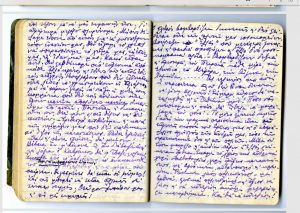
The decision to adopt the Arieh children could not have been made without her active involvement, indeed was probably made at her initiative.
It is inspiring to think about how adopting the two Arieh children, symbolically, at last fulfilled Zoe and Julio’s lifelong desire to become parents, even if only briefly.
Now that the new details about Zoe’s life have come to light, it is to be hoped that Yad Vashem will finally recognize her along with Julio as Righteous Gentiles.
An application on behalf of Julio was made by the International Raoul Wallenberg Foundation a number of years ago but was rejected by Yad Vashem apparently because of his tainted anti-Semitic background.
Not only did Zoe and Julio save the lives of the 28 Macedonian families, they also adopted the two Arieh children at a moment when the lives of all Bulgarian Jews were in peril. They did not know that the Bulgarian government, as a result of protests by several Bulgarian groups, would halt the deportations.
It is also to be hoped that Zoe’s eloquent diary, published this past January under the title From Sofia With Anxiety, will earn her a rightful place in the pantheon of Greek and Holocaust history.
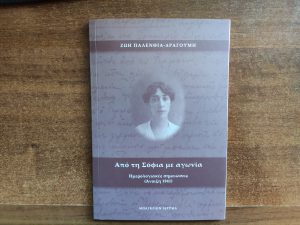
Her story serves as a poignant example of how historians have so often neglected the role of women.
As actress Natalia Dragoumis, a great-niece of Zoe, speaking at the book launch of Zoe’s diary, aptly concluded: “There’s no question that if Zoe hadn’t been a woman, this story would have been known a long time ago.”
Bernard Dichek
Bernard Dichek is a filmmaker producing a dramatized documentary about Zoe and Julio Palencia.
Times of Israel April 21, 2020
https://www.timesofisrael.com/what-made-an-anti-semitic-spanish-diplomat-rescue-150-macedonian-jews-his-wife/
